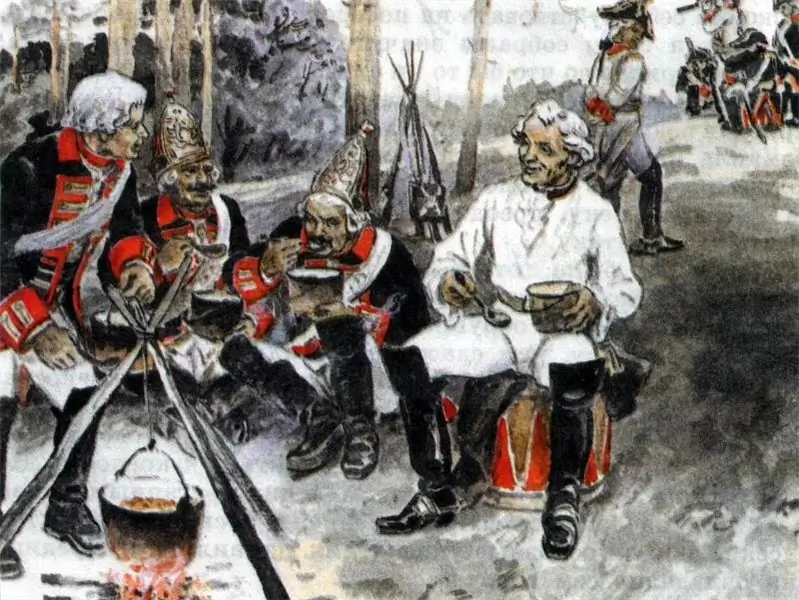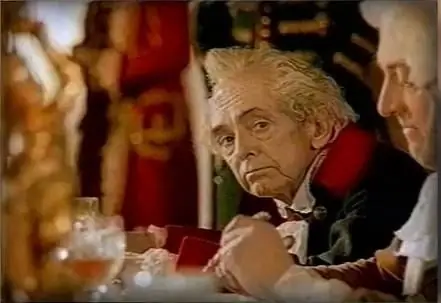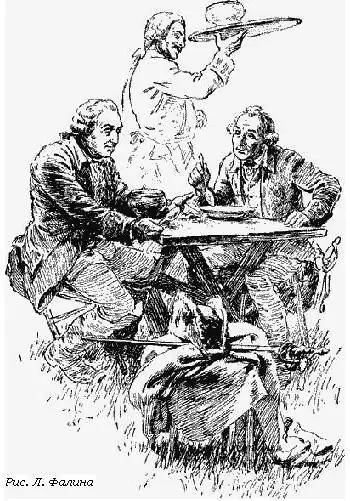- Author Matthew Elmers elmers@military-review.com.
- Public 2023-12-16 21:49.
- Last modified 2025-01-24 09:17.
I came across a collection of articles by Mikhail Ivanovich Pyliaev, a man who lived for a long time (1842-1899), but who was a witness to many events and who found many witnesses of events that he himself was not an eyewitness to.
In general, Pylyaev was a man of theater, was the author of numerous articles on the history of theater and reports on art exhibitions. But we are not interested in Pyliaev's theatrical activity, but in his historical one. Mikhail Ivanovich collaborated with the Istoricheskiy Vestnik magazine, and there, naturally, he published non-theatrical notes.
"Father of Suvorov" and "Day of Generalissimo Suvorov" - from these historical notes one can add up what and how the greatest Russian commander deigned to eat. By the way - very informative and remarkable.

It is worth recalling that since childhood Suvorov did not differ in health, and the war with his own stomach was fought all his life by Alexander Vasilyevich. However, having lived almost 70 years, having spent almost all his life in campaigns and wars, we can say that in this regard, Suvorov remained the winner.
First, a few words about those thanks to whom the preferences of Alexander Vasilyevich became generally known. These are his servants, of course. The main one was the valet Proshka, or Prokhor Dubasov, who served under Suvorov all his life and died after the Generalissimo, in 1823. By the way, he was awarded decent awards for his service: King of Sardinia Karl Emmanuel sent Proshka two medals on green ribbons, with the image on one side of Emperor Paul I, on the other - his portrait, with the Latin inscription: "For the preservation of Suvorov's health." And the Russian Emperor Alexander the First granted Dubasov the third class rank with a pension of 1,200 rubles a year.
The second was Dubasov's assistant, podkamerdiner Sergeant Ivan Sergeev from the Kozlovsky Musketeer Regiment. Sergeev served with Suvorov for 16 years, and after his death he served with Arkady Alexandrovich Suvorov until the death of the Generalissimo's son. There was also Suvorov's orderly, Sergeant Ilya Sidorov. The paramedic (here they changed regularly), who blew Suvorov and put leeches.
The fifth and last is the chef Mitka (in other sources - Mishka), the main one in our story.
So, the day of Generalissimo Suvorov from a gastronomic point of view.
Suvorov's day began on a calendar basis and ended with night tea. At two o'clock in the morning Suvorov poured cold water from a couple of buckets, dried himself and Mitka poured him a cup of tea.
Suvorov was very fond of black tea, subscribed to it from Moscow. “Buy at the price, no matter how dear it may seem to you, choose it through connoisseurs, but pass it on to me in a very safe way, so that he doesn’t gain a foreign spirit, but keeps his spirit very pure”. Suvorov carefully studied the tea sent to him, ordered to sift through a sieve several times. Mitka always brewed tea in the presence of Alexander Vasilyevich. Usually he poured half a cup, Suvorov tried it, and then gave instructions whether to top up or dilute with water.
Suvorov drank a lot of tea. On fast days, three cups with cream, on fast days without. In general, Suvorov was a very devout man, he observed the fasts very strictly, and on Holy Week he ate only one tea.
Tea was usually followed by the "approval" of the menu for the day. Ornate, in fact, Suvorov asked Mitka what he would cook for him and what for the guests. They were different things. Suvorov often invited guests to the table, he loved to treat, but he did it in a very peculiar way.
For Suvorov personally, Mitka cooked either soup, if the day was fast, or cabbage soup, if it was fast. The second was always roast. Suvorov could not stand sauces, he was indifferent to sweets.
It was interesting with the guests. The cook prepared for them separately. Suvorov's usual dinner consisted of only four courses. The big dinner party is seven. By the standards of those times, Suvorov could be called greedy, but … For a commander, the level of kitchen mastery was not fundamental in life. Sorry for his guests.

Suvorov was very fond of receiving guests, adored conversations at the table. But he hated a glutton, and a person who paid more attention to bodily food could not claim a second invitation to dinner.
Moreover, if someone invited Suvorov to visit, then he should have invited his Mitka too! Suvorov with great difficulty ate food that was not prepared by his chef. So Suvorov at a party was a real hemorrhoid for the owner, but if you act as the Generalissimo wanted, then everything went quite normally.
I will distract you with a story "off topic". Potemkin, who did not have a good relationship with Suvorov, really wanted to dine with him. In fact, he asked for dinner at Suvorov's, but the Most Serene Count was not a modest one, about which Suvorov was well aware.
Therefore, Suvorov arranged dinner for Potemkin, but as always - with a trick. The Generalissimo invited Mathone, the head waiter who served at Potemkin, to his place and ordered him a simply sumptuous dinner for Potemkin and his retinue. He ordered not to spare money and to prepare a ceremonial dinner for His Serene Highness.
And since the day for which the dinner was scheduled was fast, then summoning Mitka, Suvorov ordered him to cook two ordinary lenten dishes …
The dinner was a success. Everyone liked everything, "the river of grape tears bore the spices of both Indies" (this is how Suvorov himself complimented the dinner), even Potemkin was amazed at the luxury and scope. But he finished off Potemkin … Matone, who sent Suvorov a bill for more than a thousand rubles. Suvorov didn’t pay, wrote on the account “I didn’t eat anything” and … sent it to Potemkin!
Suvorov really only ate his own lenten dishes.
Potemkin withstood the blow, paid the bill, however, said that "Suvorov is dear to me." The obscene expressions, which Count Grigory Alexandrovich was very good at, history has not conveyed to us. But there is no doubt that they were. A thousand rubles - this was also a fair amount of money in those days, the same Suvorov on newspapers (eight), of which six foreign, he spent three hundred rubles a year. And then lunch …
So, Suvorov's lunch. Morning tea was long ago, right after getting up, and Alexander Vasilyevich got up early. He never had breakfast, so his lunch time came at 8 in the morning. That is why the question about lunch followed the night tea.
So Suvorov's usual dinner was after a divorce and reading newspapers, at 8 am. If ceremonial or festive, then at 9 o'clock.

Before dinner Suvorov deigned to have an appetizer. One glass. It was either caraway vodka or gold. If Suvorov's stomach prevailed that day, then a glass of penny fell into him. Pennyk, or half-bar, is a bread distillate (wheat, rye, barley - it doesn't matter) of double distillation, and even forcibly refined with milk or charcoal, with a strength of 38-40 degrees.
As a snack, there has always been salted radish, and only that.
The dishes were not put on the table, but they carried them in the heat of all the guests. Suvorov was offered not every dish, but only the one that was "his". As already mentioned, Suvorov observed the greatest moderation in food, the stomach forced.
But since Alexander Vasilyevich was a very addicted person, Proshka always stood behind him, whose main task was to prevent Suvorov from overeating. That is, Proshka simply took away a plate from Suvorov if he wanted to eat too much. And if Suvorov began to roar at Proshka, then he answered with an imperturbable face: "According to the order of Field Marshal Suvorov." Alexander Vasilyevich usually "turned on the back" with the words "Yes, he must be obeyed!"
Moreover, if Proshka suddenly gave slack, then for this he usually received a penalty from Suvorov himself. "Why did I give too much to eat!" - reprimanded Suvorov, who was beginning to torment his stomach.
At dinner, in terms of wine, Suvorov drank a little Hungarian or malaga, and on festive days he could drink a little champagne. Desserts and fruits were also not his favorite topics, except sometimes with tea he could eat lemon wedges, sprinkled with sugar. But not often. He could have eaten some jam with wine, which was sent to him by the manager from the estate. Cherry or apricot usually.
Lunches in the campaign were also not in one. Suvorov liked to call generals. The table was set for 15-20 people. The same seven or less dishes, for there is nothing to burden the stomach with excesses during the campaign. “Shchi and porridge is our happiness,” as Alexander Vasilyevich himself used to say.
After dinner, Suvorov liked to “sediment” his food, drinking a glass of dark English beer with sugar and lemon zest. It is clear when he lived in the capital.
As for the religious nuances, apart from one tea on Holy Week, Alexander Vasilyevich had one more leap. He hated chicken eggs. Not in any form. On Easter, after the service, Suvorov presented everyone who was in the church with an egg, Prokhor and Ivan Sergeev stood behind the commander with baskets full of eggs. Suvorov himself did not take eggs from anyone and did not use them.
Easter cakes and Easter were on his table all Easter week and offered to everyone.
On Maslenitsa, Suvorov favored buckwheat pancakes. Pancakes were usually eaten with ghee and tea; Alexander Vasilyevich ignored various accompanying Russian fillings such as caviar or herring.
On big holidays, Suvorov, as a sociable person, gave balls. This is a very peculiar business, given the owner's habits. Nevertheless, Alexander Vasilyevich was seen hosting balls. On Shrovetide - up to three times a week.
Suvorov himself did not like balls. Naturally, he did not interfere with others and did not spoil the guests' mood, and when it came time for him to rest, he quietly stopped the party and went to rest, letting the guests have fun all the way.
What can you say about Suvorov's culinary preferences?
First: cabbage soup, both full and lean. Both from fresh cabbage and sauerkraut. Beshbarmak. Ear on fast days.
Second: boiled beef with different spices, steam room (oven). Dumplings. Roast game or beef. Porridge.
As lean dishes: mushrooms, as they say, in an assortment, in all possible forms. Mushroom pies. Of the fish, Suvorov favored pike. Both boiled and "Jewish" stuffed.
No salads, no fruit. Very simple, but easy to do in almost any location.
And again, from birth, not distinguished by health, the person spent so many campaigns and made so many trips, and all not in greenhouse conditions. Yes, Alexander Vasilyevich fought with a stomach all his life, but I believe that he won a decisive victory.
And before moving on to the recipe, I will give the life principle of the great commander:
“Do not go to this poorhouse (she meant the hospital). The first day you will have a soft bed and good food, and on the third day there is a coffin! The doctors will kill you. And better, if you are not well, drink a glass of wine and pepper, run, jump, lie around and you will be healthy."
Well, as promised, several recipes from that time that Suvorov loved.
Ukha with pickles
Take 3 pounds (even about a kilogram) of any small river fish. Today, you can not small, just peel and chop. Boil in 2 liters of water. When cooking the broth, add parsley root, celery (your choice, stem or root, whichever tastes better), bay leaf (1-2 pcs) and black peppercorns up to 10 pcs.
The fish is cooked until completely cooked. Shortly before the end of cooking, pour in half a glass of cucumber pickle. Remove the broth from heat, filter (you can just throw out the roots and bones), add chopped pickles (3-4 pieces of medium size), I highly recommend adding pickled mushrooms, parsley and a spoonful of sour cream.
A very peculiar taste. Yes, supposedly, as is customary in Russia, do not pour vodka in your ear. Vodka separately, inside.
Valaam mushroom cabbage soup
A universal thing, by the way. We make it with meat broth - ordinary cabbage soup. We do it on the water - lean.
We start by making the broth. A good piece of brisket for 3 liters of water. Plus bay leaves, allspice, carrots, parsley root. Boil, throw away everything except meat.
We cut the onion (1-2 pcs), cut the mushrooms (400 g). Fry. Shred cabbage (300-400 g). We put everything in a container (a saucepan, a pot, someone has something), fill it with broth and put it either on a very small fire, or (better) in the oven (130-150 degrees) and there we simmer for 3-4 hours. As under Suvorov in the stove.
It is possible to use sour cabbage instead of fresh cabbage, or even better - a mixture. A third is sauerkraut and two-thirds fresh. And it will be very tasty.
Pike with horseradish
Difficult and a little masochistic, but whoever can handle it will be rewarded.
Cut the pike into pieces and boil until about half done (simmer for 10 minutes over medium heat). We take out of the water.
Chop two onions finely and finely and begin to fry in oil. While the onion turns red, take 1-2 sticks of horseradish and three on a grater. Weeping, we throw it to the bow. Horseradish with onions in a ratio of 1 to 1. Fry. When the onion turns completely blush, and you start to see, we stop it.
We take a container, put a number of pieces of pike on the bottom. Then we put the result of frying on the fish in an even layer. Next, the second layer of fish and again smear with onion. Put a layer of sour cream on top and send it to the oven for an hour and a half at a temperature of 120 degrees, or on the stove or barbecue for half an hour at medium heat.
The brazier or stove is really dry. It will be very tender and juicy in the oven.
By the way, if it really bothers you in terms of fasting, do not pour sour cream and you have a very lean dish. To avoid dryness, you can splash a couple of tablespoons of sunflower oil.
Oddly enough, this yummy is very good with porridge. Bulgur, poltavka, even barley will do. Onion-sour cream-horseradish sauce will flavor any porridge. And if the pike is 150+, then you can easily wade Rymnik.
Suvorov-style roast
We take the meat. Beef, pork - it doesn't matter. It is important to have the pulp. You don't have to touch the tenderloin at all, the rump or the back can be poked a little with a hammer, but in such a way as to simply disrupt the structure of the meat.
Then we rub the meat with pepper, salt and tie it up and down with a twine so that it does not creep. And you can start frying. First you need to "seal" it, that is, grab it with a crust over very high heat. On what to fry … Pork can also be on lard. I would prefer beef in vegetable oil, where I would certainly throw a piece (20 g) of butter.
Fried-sealed? On a baking sheet and into the oven. Give the temperature 170-200 degrees. And do not spare the fat on the baking sheet. There will still be juice from the meat, so they need to water the pieces from time to time so that the meat does not dry out.
And to make it completely delicious, it is worth placing vegetable accompaniments around the meat: carrots, turnips, celery, potatoes, eggplant zucchini. Who has what at hand. I took carrots, turnips and squash.
You can do this in a frying pan, but it will have to be there on low heat, without a lid and constantly turning it over so as not to burn. The oven is better.
In general, the dishes are very simple, but tasty and nutritious. I do roast regularly, the rest is at least a couple of times. If anyone decides to repeat it, good luck and enjoy your exploration of history.






